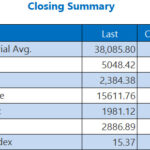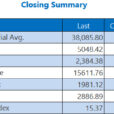
Managers say the focus this year will be on restructuring and shopping for value assets. As heads of investment banking survey a new year, some of the most crucial documents in their possession are the detailed lists kept by their subordinates of the expected dealflow. These extensive lists, referred to as the pipeline, are kept rigorously up to date by all investment banking teams, but in 2009 they are looking thinner than in previous years.
Some managers say they might well be virtually useless in providing them with a guide to what activity to expect in the next 12 months.
Two years ago, in what must seem like another age, managers could leaf through page upon page of upcoming deals showing a record level of pent-up activity across their mergers and acquisitions and capital markets businesses, but in January 2009 the situation bears little comparison.
But despite the backdrop of a deteriorating world economy and a financial sector wrecked by more than $1trn of writedowns in 12 months, investment banks can continue to point to a small pipeline of mandates.
However, most companies are focusing their attention on the likely deluge of work from distressed corporate clients as the financial crisis ravages the real economy.
David Fass, Head of Global Banking Europe at Deutsche Bank, said: “This year is going to require the most complex and thoughtful approach we have seen in recent memory. As the world approaches the 24th month of the credit crunch, we are going to need to invent new solutions to work through the stresses and strains in the markets. For bankers, this means the amount of time we are going to spend thinking about how to help our clients will be many multiples of what it has been in recent years.”
Mr Fass mentions the increasing frequency of meetings between his teams of coverage bankers with their corporate clients, and says chief executives are eager for updates on the state of the financing markets and their options should they need to tap them.
Behind the scenes many companies have hired investment banks to examine their strategic options, from simple financing requirements to full-scale balance sheet restructuring and asset disposals.
One of the most obvious examples of this was German automotive components maker Schaeffler Group’s hire of JP Morgan late last year to examine its strategic options as its creditor banks pushed the company to provide them with more detail on how it would pay back the billions of euros they lent to support the acquisition of Continental.
Mark Aedy, head of Merrill Lynch and Bank of America’s combined European corporate investment banking operation, said: “In the past quarter, corporates have adjusted to market conditions and realised that this is a new world and they need to take action. Many of our clients have asked for full nuts and bolts reviews of their businesses and actionable business is coming out of this.”
For those companies prepared to be first movers the signs appear to be good. Bankers say the capital markets appear willing and able to buy new issues for those prepared to accept the new valuations on offer.
John Winter, head of investment banking for Europe, the Middle East and Africa at Barclays Capital, said: “The financing markets feel good at the moment. The bond market is clearly open for business, equity capital raising will be active and we think there are likely to be a lot of disposals related to corporate restructurings.”
The worry is that those that do not act swiftly to tap the markets and wait until the last minute might find the markets unforgiving and emergency capital raisings, forced asset disposals and even full-scale enforced takeovers are considered likely to be a major part of the market this year.
Mr Fass said: “There will be good companies out there that haven’t managed their balance sheet properly over the last couple of years and are going to find themselves in distressed situations. They are going to be unable to refinance and therefore they will have to take action quite quickly.”
Mr Aedy said his firm would be focusing on winning restructuring mandates in 2009, which the bank has identified as one of the biggest sources of investment banking fees over the next 12 months.
He said: “The focus will be on restructuring opportunities, but with a heavy emphasis on the capital markets and within that on equity capital raisings.”
Fishing for shares
The issue of how to position their businesses to capture the largest possible share of the fees on offer will be one of the biggest headaches for managers this year, particularly given that some are predicting a further 20 percent drop in the overall fee level in Europe this year.
Mr Winter said: “We are going to selectively reflect the market. We aren’t, for example, currently bringing issues for emerging market corporates but we will be when that market reopens. Meanwhile there are plenty of other areas where we are already very active.”
Geographically, the focus is likely to return to the large markets of the UK, France and Germany. Aside from the hundreds of billions of dollars of debt issued by the governments of each country, corporates in the developed markets are expected to provide the most business.
In the UK, which is regarded as the developed economy most exposed to the financial crisis, restructuring mandates will be the order of the day, while France and Germany may be relatively better off and able to take advantage of the opportunities the stressed markets are likely to provide. Charles Packshaw, head of UK corporate finance at HSBC, said: “Well-capitalised companies are likely to see opportunities to pick up undervalued assets in the UK. We generally expect UK deal activity to be pretty patchy, but there will be some strong sectors, such as consumer, resources and energy.”
ECM
Rights issues:
The busiest area by volume of the equity markets last year were capital increases and this shows no signs of changing this year, though the type of issues will be rather different.
If the past 12 months were dominated by multi-billion dollar capital raisings by distressed financial institutions, 2009 will be the year of corporate capital increases as a range of businesses tap the equity markets.
Emmanuel Gueroult, head of European ECM at Morgan Stanley, said: “Capital increases are likely to continue to be deeply discounted, but there is no shame attached and investors accept that the market has repriced over the last year.”
M&A
Mergers and acquisitions revenues in Europe fell by a third to $15.3bn last year as deal activity declined. Few bankers are predicting any improvement this year, but many are hopeful that things may be better than they seem.
Gordon Dyal, Global Head of M&A at Goldman Sachs, said: “The 2009 M&A market will most likely be a reflection of the global market dynamics; a balance between attractive valuations relative to historical levels and restricted liquidity. We expect 2009 M&A themes to be stock-for-stock transactions, fill-in acquisitions by large, well-capitalised corporates as well as emergency sellsides to address capital structure issues.”
Winning restructuring mandates is likely to be one of the keys to success this year, with many disposals being linked to working as an adviser on these types of transactions. The financial services sector is also expected to be another source of dealflow. A report published recently by US advisory firm Freeman & Co highlighted the continued need for consolidation among broker-dealers as well as the pressure on asset managers to merge.
Mr Freeman also predicts that stock exchanges will be active buyers of credit data-focused firms this year as they prepare for the advent of centralised clearing in the credit default swaps market.
Jumbo private equity deals may be dead, but with billions of dollars at their disposal bankers have not written financial sponsors out of their calculations for the next 12 months. Mr Freeman expects private equity firms to be active in the financial institutions sector as they use 2007 and 2008 vintage funds to buy assets on the cheap.
Convertible bonds
Equity-linked paper was one of the worst performers last year and convertible bond funds endured a torrid 2008. Analysts at Barclays Capital expect the convertible bond market to continue to shrink over the next 12 months as new supply continues to be exceeded by maturing issues.
Despite this, convertible bonds may continue to be one of the more active areas of the new issue market in 2009, as investors look for their combination of downside protection with the potential to profit from share price rises.
Several banks last year, including Barclays and UniCredit issued convertible bonds as part of their capital raising and bankers expect corporates to follow their lead.
Mr Gueroult said: “Though the equity-linked market has been very quiet, we think it could come back this year.”
Initial public offerings
Falling valuations and record volatility brought the new issues market to a virtual standstill last year and few expect an improvement any time soon.
Large issues such as the stock market listing of Deutsche Bahn have been postponed, with no date set for when they might return.
Thomas Gottstein, co-head of ECM for Europe, the Middle East and Africa at Credit Suisse, said: “There will need to be continued improvement in volatility, which has come down to below 40 percent, before the return of initial public offerings and there will need to be a clearer consensus about the length of the recession.
There is a lack of confidence in earnings or price to earnings valuations. A sustained recovery in equity markets isn’t likely until credit spreads have narrowed.”
A pipeline of issues is building from the Middle East with Dubai property developer Nakheel reported to be considering up to a $15bn flotation and several other smaller deals are in the pipeline.
Blocks
With bankers talking about a new-found realism among chief executives, expectations are growing that companies may be more prepared this year to accept the new valuations attached to their own shares and equity holdings.
UK utility Scottish and Southern recently accepted almost a 10 percent discount when selling a block of new shares to raise £479m and others are likely to follow as they attempt to finance ahead of the crowd.
Large block sales could also be back on the cards, sooner rather than later. UBS in a report published in January estimated that of the $1.5trn of European equities held by businesses, more than $160bn could be considered “loose” or under review for a possible sale.
Of this total, about 50 percent are held by corporates and, with many companies’ balance sheets under greater pressure than at any point in recent years, sales of these stakes this year are now considered more likely than they were last year, despite the fall in equity valuations.
Mr Gueroult said: “Sellers are now prepared to accept discounts on block trades. There is an acceptance that the market has repriced and that higher-valuation discounts may be required to complete trades.”
European government bond market
Analysts estimate a record €185bn was issued by the US and European governments in January, with up to €736bn expected to be issued by the end of the year from €576bn last year, according to calculations by Nordea analyst Jan von Gerich.
The four largest Eurozone economies will represent the biggest issuance, with Germany issuing up to €149bn of bonds, up by €8bn from last year, France issuing €145bn, up by €30bn, Italy €220bn, up by €20bn, and Spain €75bn, up by €15bn, according to analysts.
Germany and France are the main pillars of Eurozone issuance, rated triple A by rating agencies. Bankers said the recent failure of a €6bn auction by the German Government was not too serious. Less than a day later, a French issue was subscribed by investors.
Of France’s total financing need this year, €79.3bn results from the projected budget deficit for 2009 and €110.8bn from medium-term and long-term bond redemptions falling due in 2009. Other state commitments will amount to €1.6bn.
Germany’s financing plans this year give greater weight to short-term instruments as it faces rising financing needs in the economic downturn. Aside from capital market issuance of €149bn, its treasury bill, or Bubill issuance, is set to rise to €174bn from this year’s target of €72bn.
Several governments in Europe, including Germany, have moved to cover their rising financing needs in 2009 with higher issuance of treasury bills.
However, analysts warn it may prove problematic if governments rely on treasury bills and then have to return to market to continue financing in six or 12 months’ time, when yields could rise.
Corporate bond market
The European investment grade corporate bond market has reopened on stronger sentiment this year, but corporate treasurers, bond bankers and investors have their work cut out to navigate still treacherous new issue conditions.
Suki Mann, credit strategist at Société Générale in London, forecasts a possible low of €80bn – versus €133bn in 2008 – for investment grade non-financial bond supply this year.
Mr Mann said should the new issue window be open for longer, €120bn is reachable.
Top of investors’ wish lists for new issues are bonds from well-rated, well-known companies in non-cyclical industry sectors, with riskier credits rarely getting a look-in.
For industrials, bankers warn if conditions prove too onerous, companies may use free cashflow and/or draw on their bank lines instead of issuing bonds.
For utilities, forecasts are between €25bn and €40bn for supply due to redemptions and large M&A refinancing needs. Analysts believe E.ON and Enel have around €5bn available for funding. EDF, Iberdrola, Gas Natural and Vattenfall have €2bn to €3bn each to refinance and Nuon and EDP Group around €1bn to €1.5bn each. GDF Suez has another €1bn and EnBW around €500m.
Technology, media and telecoms issuance could reach €28bn, of which €22bn will come from telecoms groups, led by France Télécom, Deutsche Telekom and Vodafone.
In the motor vehicle sector, €18bn of potential supply is forecast, while €15bn is expected from the consumer and services sector this year.
Financial institution bond market
Issuance this year from the insurance sector may be a “difficult number to predict”, according to Barclays Capital, but issuance from the damaged banking sector could fill that void, as banks exploit government debt guarantees to raise capital.
Fritz Engelhard, head of European fixed-income strategy at Barclays Capital in Frankfurt, said: “It is not only a matter of how expensive the funding is, it is about accessing term funding and managing liquidity.”
European banks issued €40bn of government-backed bonds last November and December. This year, that could be €250bn, according to estimates from Frank Will, frequent borrower strategist at Royal Bank of Scotland. Other houses have forecast up to €500bn of supply.
In senior funding, the supply outlook is made more difficult by the prospect of government-guaranteed issues. However, Barclays said there was €270bn of senior redemptions this year, which indicates new supply.
For subordinated supply, Société Générale forecasts €13bn of lower tier two capital bonds, and €2bn – down from €6bn last year – of tier-one capital bonds.
Securitisation market
Securitisation was linked to the sub-prime crisis in the US and was a cause of wider economic malaise. As a result, the market was the hardest hit and has been at a standstill since the middle of 2007.
Bank issuance, however, has been hitting highs. Deutsche Bank research said €50bn of asset-backed securities were issued in the week starting November 9, an 18-month high. The reason for the spike is increasing use of central bank lending facilities, which now accept these securities as collateral for loans.
Merrill Lynch research published last week estimated 97.5 percent of securitisations in 2008, totalling €600bn, were retained by banks. Germany, Spain and Italy have announced specific funds aimed at purchasing ABS with a combined maximum total of €170bn. The UK is expected to follow.
Stuart Jennings, Structured Finance Risk Officer for Europe, Middle East and Africa at Fitch, said in a statement on January 7: “This is an apparent recognition that banks will have to continue to tap central bank funding for the foreseeable future.”
© eFinancial News, 2009. www.efinancialnews.com










